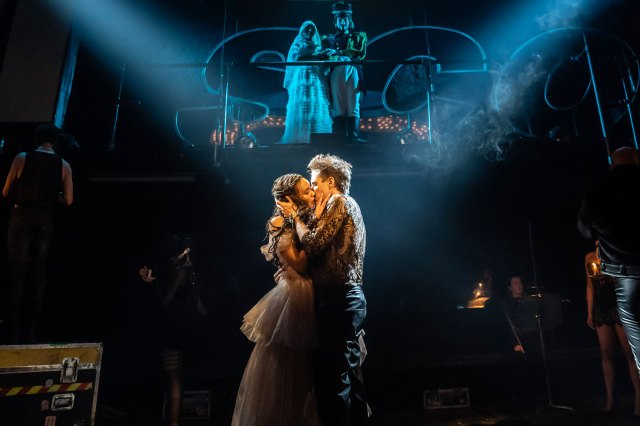Natasha, Pierre and the Great Comet of 1812 review – infinite riches in Dave Malloy’s musical
The musical makes its eagerly anticipated debut at the Donmar Warehouse

Tolstoy’s War and Peace is 1,440 pages long. Composer David Malloy has taken 70 or so pages from the second volume and turned it into a sung-through chamber opera – both epic and intimate, vast and tiny. It is magnificent, infinite riches in a little room.
That sense of sliding scale is at the heart of Timothy Sheader’s UK premiere production, which is also his first as artistic director of the Donmar. The focus constantly moves from the ensemble to an individual, from a riotous group dance to an isolated figure singing their heart out.
It has a directness of approach and entreaty that make it instantly engaging from the moment the cast stride out to sing a prologue which informs the audience that they are going to have to study their programmes if they want to keep up with the plot “’cause it’s a complicated Russian novel/Everyone’s got nine different names.”
In fact, the story is crystal clear as young Countess Natasha Rostova turns up in Moscow to await her fiancé Andrey, who is away at war and finds herself falling in love with the sexy scoundrel Anatole, who tempts her to elope. Her journey towards ruin is parallelled by Pierre who is “rich and unhappily married” finding a path to revelation and salvation. Their trajectories cross on the night the Great Comet appears, bringing Pierre a confirmation of his blossoming into a new life.

Malloy, who provides music, lyrics, book and orchestrations, traces the outline of each character – and there are many – within a score that moves from classical to kletzmer, from electronic drumbeats to heavy strings. He quotes widely from Tolstoy, often letting characters shift to the third person to describe their own reactions. “I blush happily,” says Natasha as she imagines her wedding to Andrey.
Only once – when Pierre realises he is beginning to love Natasha – is there speech; but often the score, played by an onstage band under musical director Sam Young, resolves to a simple piano refrain or a single blast on the clarinet. It’s richly textured, shifting through multiple moods.
The journey of the show, from off-Broadway innovation in 2012 to a lavish Broadway spectacular in 2016 (both directed by Rachel Chavkin), has left Sheader scope to go his own way. His innovations include contemporary costumes (by Evie Gurney) and a set by Leslie Travers that is dominated by the word Moscow, with a missing first ‘O’ that is found in a heavy ring of lights that begins on the floor and periodically rises to the ceiling.
It’s Howard Hudson’s lighting design, switching between brilliant colour and monochrome shadows that does the heavy lifting on changing the locations, from the iridescent green drinks in the nightclub scene to the heavy red erotic lights of the opera where Natasha first meets Anatole.
The atmosphere conjured is intense, but always lively, with jugglers juggling, and dancers whirring round in Ellen Kane’s punchy choreography. There’s nothing superfluous. Everything is concentrated on moving the story at terrific pace, while revealing the emotions propelling it. The cast is uniformly superb, singing and acting with panache and power.

Each has moments in the spotlight, from Jamie Muscato’s swaggering Anatole, to Daniel Krikler’s sure shot Dolokhov, surprised to be wounded by Pierre in a duel. As Natasha, Chumisa Dornford-May conveys a gentle innocence that is completely undermined by the first stirrings of passion; as Sonya, the cousin determined to save her, Maimuna Memon seizes the moment when she makes that resolve in a soft aria of devotion.
Declan Bennett’s Pierre sings with astonishing strength and passion, tracing a journey from doubt and self-loathing – “I can be better than this” – to a sudden realisation of the potential sweetness of life. It’s a riveting journey, true to Tolstoy’s themes yet compressing his mighty thoughts into one of the best new musicals for years, both hugely entertaining and deeply intelligent.


















